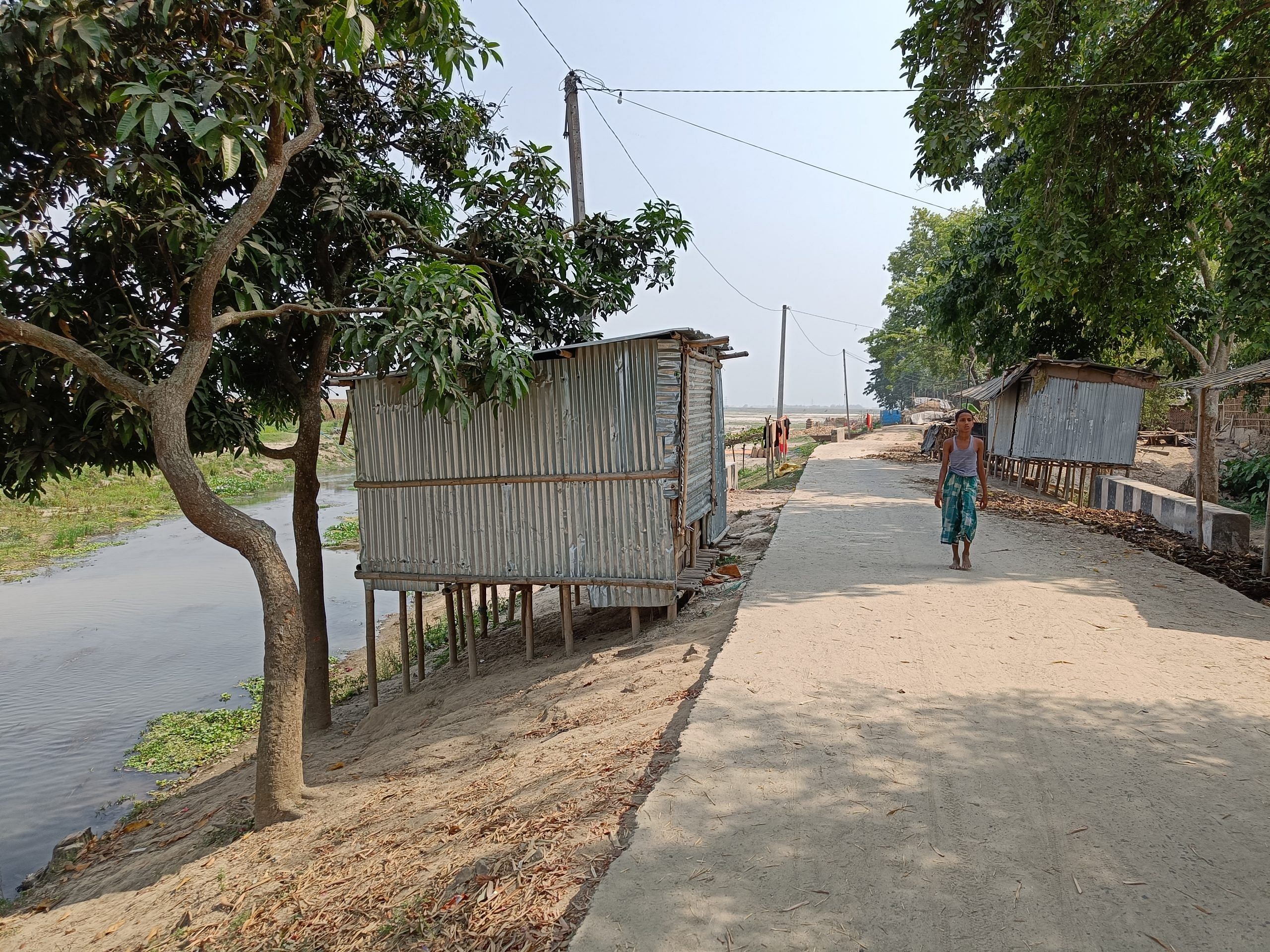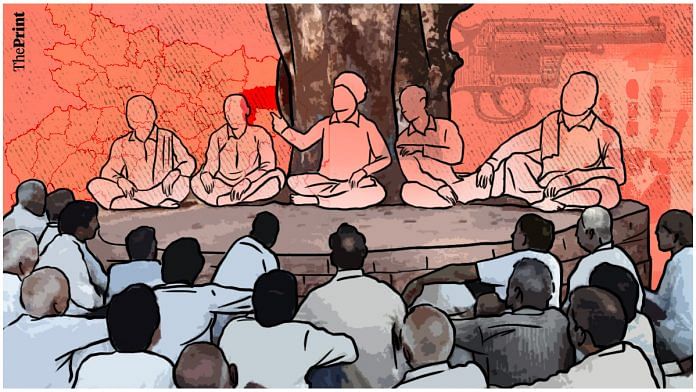Purnia: Sandwiched between two rivers, the inaccessible Tarabari village in Bihar’s Purnia district has been ignored for development projects for decades. But a double murder has virtually ended the village panchayat body and created an unprecedented constitutional crisis for the state.
The entire village panchayat — from the village head (mukhiya) to the sarpanch to the deputy sarpanch to ward members — is either on the run or in jail. They’ve been accused of the murder of the Panchayat Samiti and his close aide. And for the past ten months, the villagers have had no one to turn to.
“Ever since the murder case, this panchayat has become deserted. We are like orphans. The respect for the village has gone,” said Absar Alam, a young man from Tarabari who works on the farms.
What was once called the unapproachable village — submerged in flood waters for four months each year — is now being mocked as a village of the murderous panchayat. And officials are clueless about how to address this abrupt vacuum in local governance.
A gory scene
Everyone in Tarabari panchayat remembers what happened on 28 June 2022 but the way they remember it is different.
The only common thread in all their recollections is a flood with incessant rain and lightning.
“Suddenly in the evening we learnt that Panchayat Samiti Shahbaz Alam and his close aide Munajir have been murdered,” said a villager, who claims he was at the crime scene that day.
The villager added that Alam and Munajir came to Mali Tola where they had a heated argument with the panchayat representatives who were carrying sticks and knives.

The spot in Baizi Bazar where Shahbaz Alam and Munajir were murdered last year | Photo: Krishan Murari/ThePrint
“After a brief argument, everyone attacked him and his aide. They ran to the nearby house to hide but were chased and brutally killed in broad daylight,” he said. The street, he recalled, had turned red with blood.
Shahbaz Alam was an imposing figure. The six-foot-tall ‘dabang’ would survey the village on his Bullet, his gun peeking through the pocket of his all-white outfit. According to the villagers, he was building up his influence by instilling fear among the people. His companion Munajir was a constant shadow.
“People considered him a messiah,” said Shahbaz’s brother Shahnawaz Alam. He came from a poor family and helped poor people in Tarabari and neighbouring villages. “My brother didn’t have a gun that day, otherwise none of them would have survived,” he said.
Shopkeepers at Baisi Bazar, the local market, alleged that Alam often extorted money from truckers and physically assault them if they did not pay up. Manish, who runs a mobile shop, claimed that Alam was involved in one such extortion incident a few days before he was killed.
The police FIR corroborates the villager’s eyewitness account of Alam and Munajir’s murder. It’s a gory story of election rivalry and local political dominance.
Shahnawaz claimed that the panchayat members used to embezzle the money received under Pradhan Mantri Awas Yojana (Rural), which his brother opposed. “That’s why everyone removed Bhaiya from their way,” he said.
On the other hand, the families of the accused claim Alam used to ask for money from the fund and threaten and physically assault the panchayat members when they didn’t comply.
In 2021, Alam was elected as the Panchayat Samiti. This wasn’t his first attempt at politics. Earlier, he had stood for the post of Mukhiya but lost.
“Using hooliganism, he strengthened his hold and then started harassing the villagers. Sometimes he used to tease girls as well,” alleged Afzal Alam, a villager.
Also Read: Yogi Maharaj’s Gorakhpur darbar is a one-stop solution for everything — grooms and goons
Unfavourable terrain
After Alam’s murder, all the accused fled from the village overnight. They have been charged under IPC Sections 302 (murder), 120(B) (criminal conspiracy), 379 (theft) and 34 (criminal act done by several persons in furtherance of the common intention of all).
“21 people have been named, 15 of whom are in police custody. The remaining are absconding,” said Ramesh Kant Chowdhary, Station Officer of Baisi police station.
Villagers said that by the time the police reached the village the next day, all the accused had fled through the river. The police officers too accept that the unfavourable terrain delayed their arrival, which allowed the accused to escape.
The relatives of the accused do not see anything wrong in killing Alam. “He had committed many sins. If he had not been killed, he would have killed all of us,” said a family member of one of the accused on the condition of anonymity.
Purnia is one of the most backward districts of Bihar. According to the 2011 census, the literacy rate here is 52.49 per cent. Around 5,000 people live in Tarabari panchayat, but there is no primary health centre here. If someone falls ill, they either have to go to Baisi or Purnia city. Many times, the patient dies before they reach the hospital.
The West Bengal border is about 15 km away from Tarabari. The villagers prefer to go to Dalkhola across the border for their shopping.
Also Read: Gaurakshaks go beyond Mewat, popping up across Haryana’s toll plazas. Hindu farmers angry
Conflicts have reduced
The people of Tarabari are not even aware that their village has created a constitutional crisis for the Bihar government. Ignored for decades, the village now also has to bear the ignominy brought by its ‘murderous’ panchayat.
All the work of the panchayat has come to a standstill. The District Magistrate of Purnia wrote a letter to the Panchayati Raj Department in January this year, seeking guidance on the implementation of development works in the Gram Panchayat and the operation of the Gram Kachari.
Mihir Kumar Singh, additional chief secretary of the Panchayati Raj Department, admits that this is the first case of its kind that the state has seen.
The double whammy of the village’s difficult geography and the murders have dampened the development prospects even further.
Baisi MLA Syed Ruknuddin said that until the anti-erosion work is done, the village will not be connected to the district headquarters. He claims that the work has begun now after multiple requests to the government.
Villagers said that no such work had started. As the monsoon draws closer, the apprehensions of a flood are rising among the people. After the 2017 floods, the rivers (Mahananda and Kankai) changed their course and streams gushed through the middle of the village, which not only took away people’s land but also made life difficult.
“There is no good road in the village. The new Mukhiya and sarpanch were chosen so that the road would be built and other works would be done as well, but all that is now in limbo,” said Noor Alam, one of the villagers.
He said that the government gives cemented houses at subsidised rates for poultry business, but due to the non-functioning of the panchayat, villagers are not getting that either. “Nobody has received the money for the last 10 months,” he said.
There is, however, a silver lining. Camp fights between villagers have gone down.
People know that even if an issue arises, there is no one to solve it at the local level.
Pinku Hoda, son of former Mukhiya Najmul Hoda said that the village elders have gotten together and resolved whatever cases have come up in the past months
Also Read: Tractor ride, midnight fear: Muzaffarnagar victims recall riots but unmoved by rape verdict
Constitutional crisis
The responsibility of finding a solution to the unique constitutional crisis was given to the advisor of the Panchayati Raj department, who diligently poured over the countless sections of the Panchayati Raj Act.
On 3 April, additional chief secretary Kumar Singh ordered the election of a temporary deputy mukhiya and a deputy sarpanch from the existing ward members, invoking the rarely used Section 172 of the Bihar Panchayat Raj Act 2006. It allows the government to “do anything which appears to be necessary to remove the difficulty”.
Two women were elected on 15 April. But there is a new twist in the tale now. The so-called solution has created a new problem. Both these newly elected women are wives of two of the accused fugitives in the twin murders.
Tarabari stands at the crossroads again. A swamp, to be more precise.
(Edited by Theres Sudeep)
To read the report in Hindi, click here.



